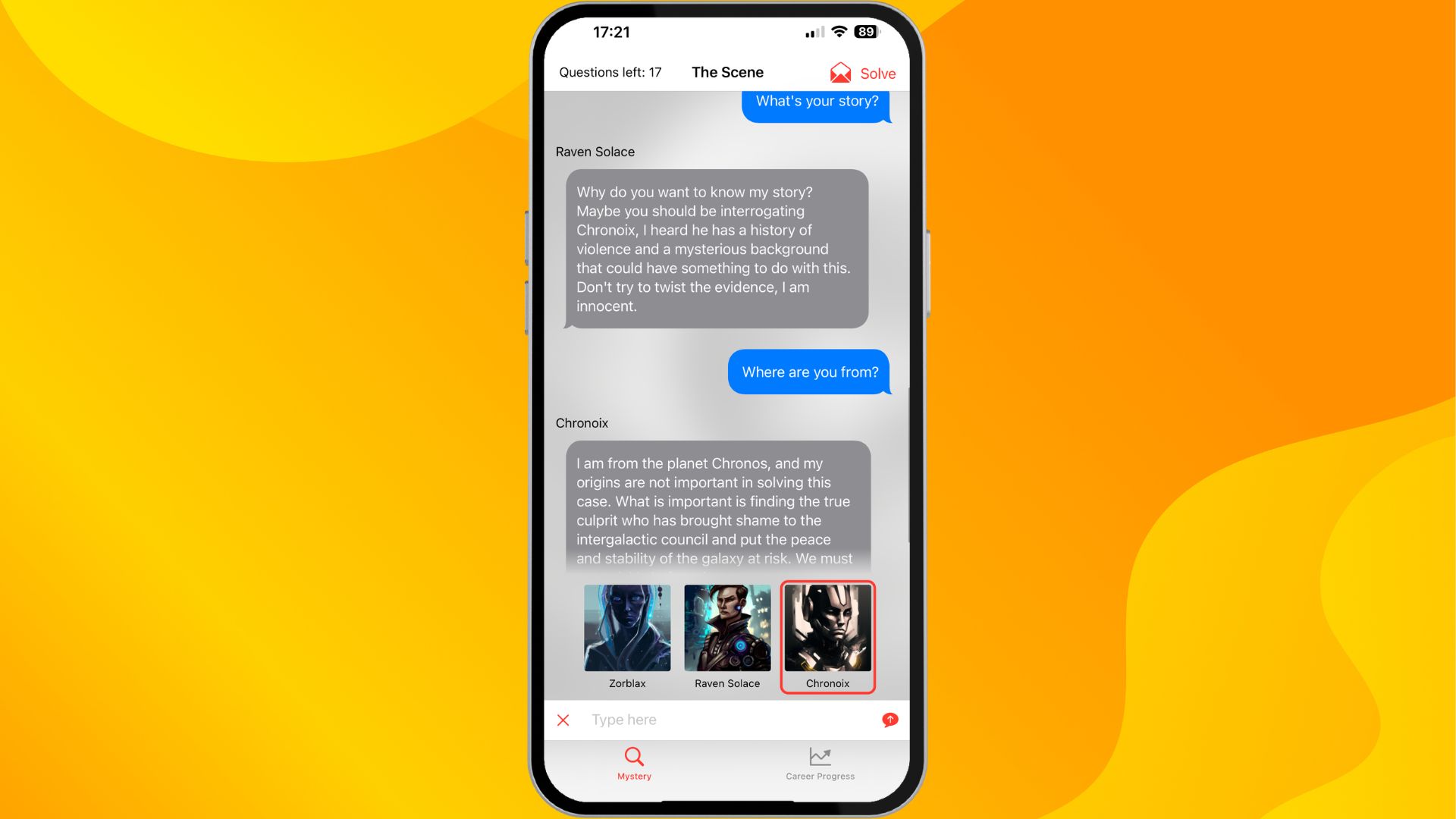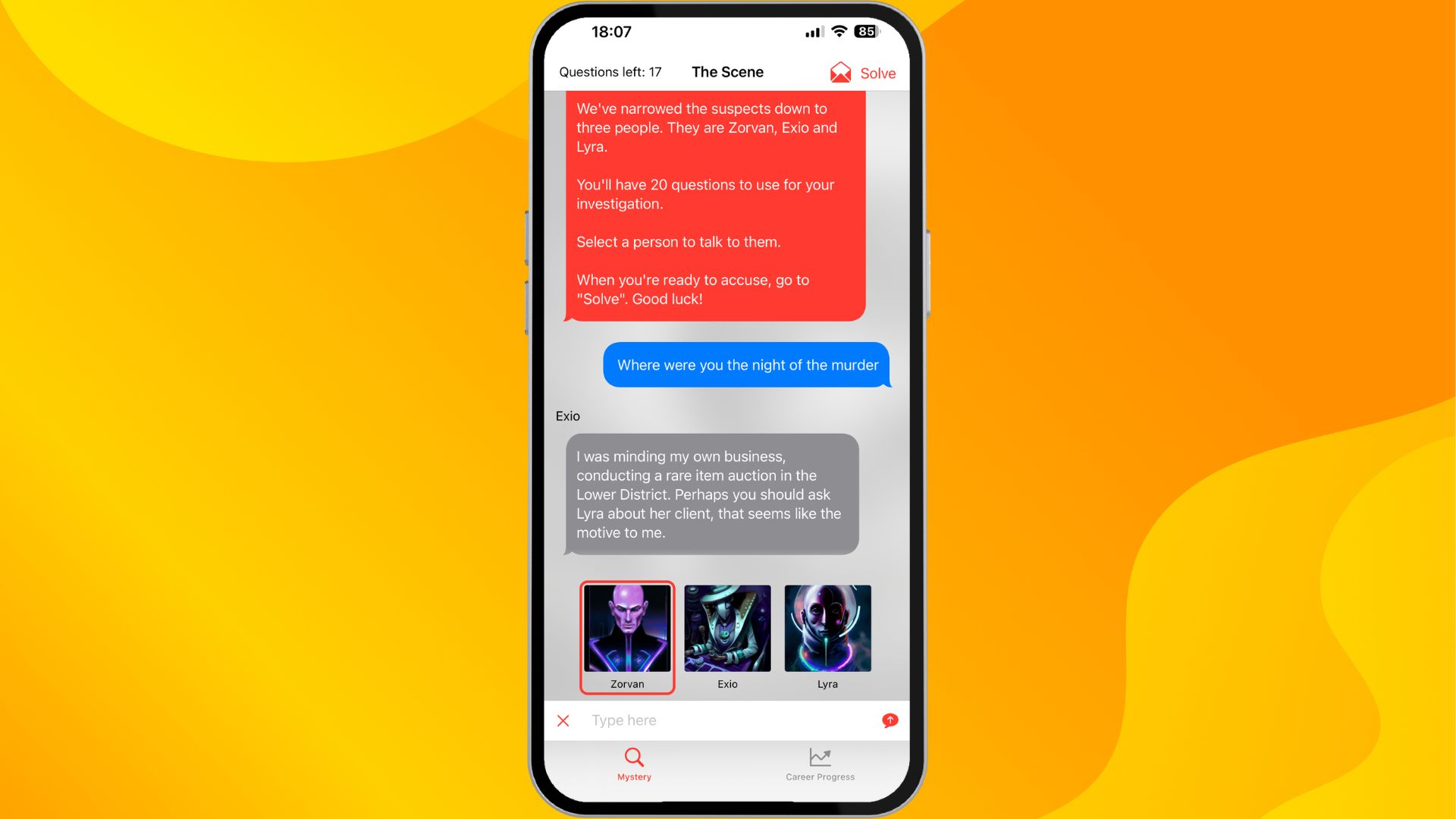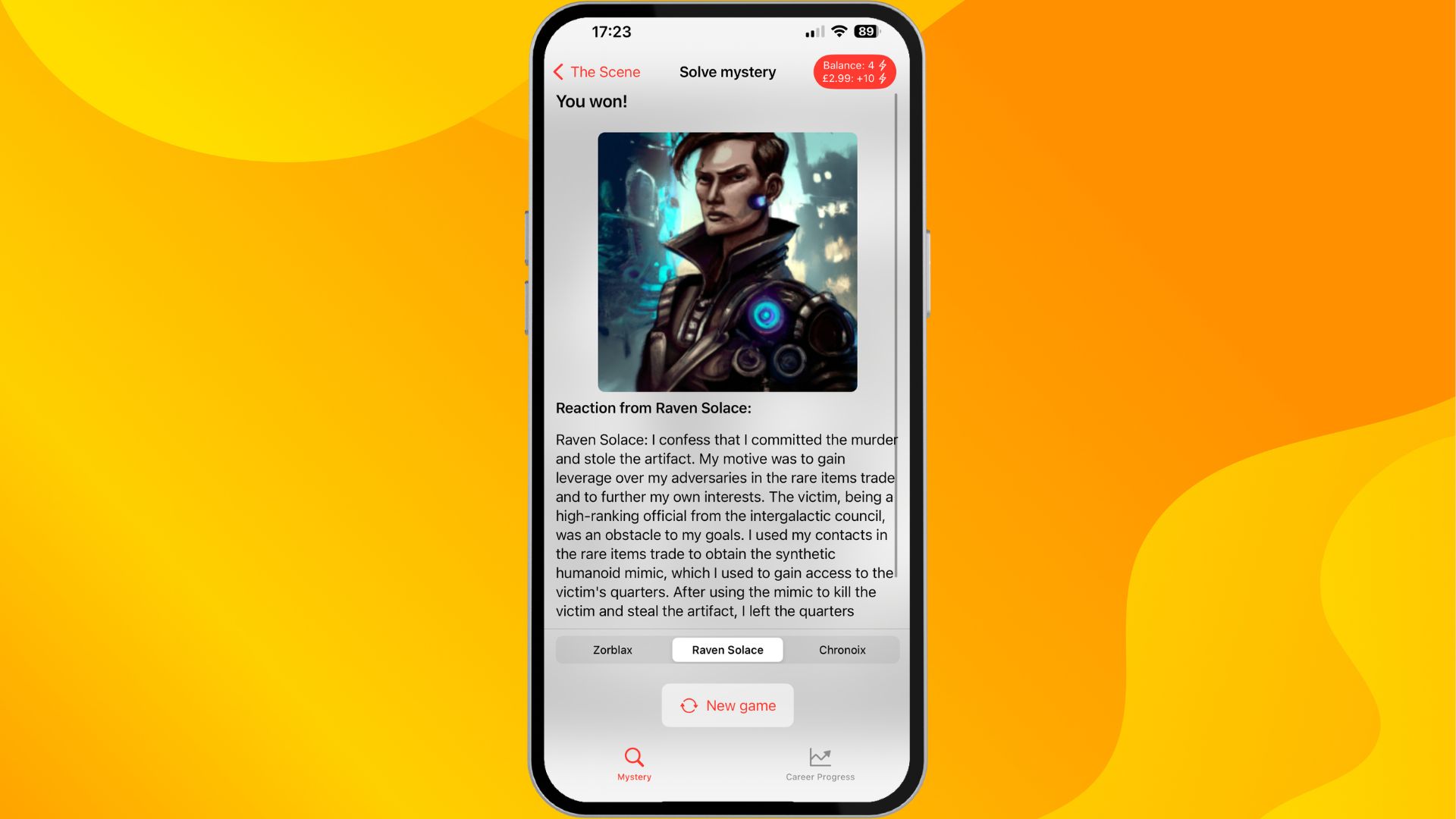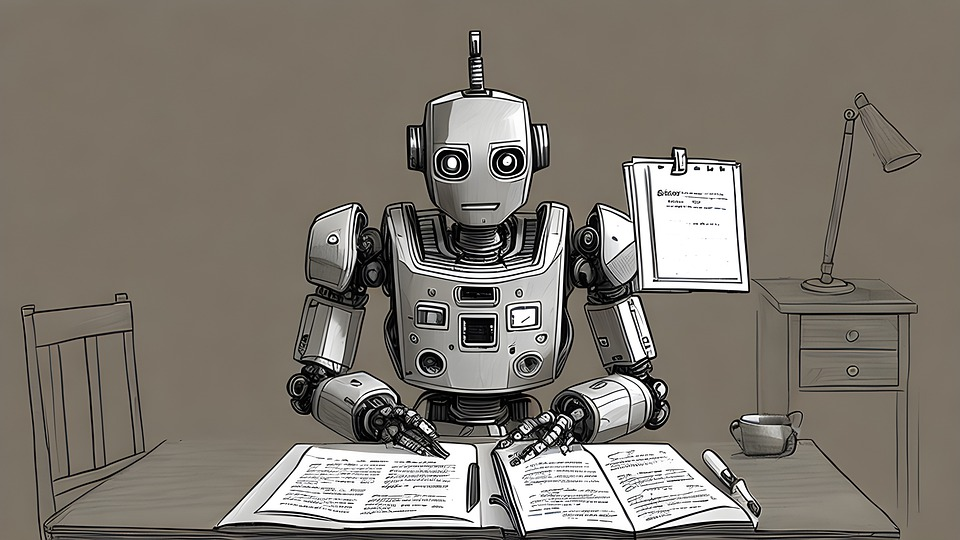I played an iPhone game powered by ChatGPT, and I'm worried how AI could be used by others
This AI game might not be great, but signals more than it knows.

I open the shutters to my office window, the wind outside blowing through the synthetic trees lining the streets below. I should’ve known she’d come to me. After all this time, she still can’t stop herself from finding trouble. Or maybe it's trouble that keeps finding her… either way, I’m the one who has to get her out of it. She climbs from the hovercar outside, holding her hat as she enters my building. What will it be this time…
Title: The Andromeda Mysteries
Publisher: Cephalopod Studio
Release Date: Apr 05, 2023
Platform: iPad, iPhone
A good whodunnit is filled with mystery. Interesting locations, curious characters, and detailed environments. More than just guessing games, they are deeply human stories that are supposed to put you in the shoes of someone with a very important job to do – solve a crime. The characters at the center of those stories are one of the most important parts of the mystery, be they believable real-life people, or sci-fi caricatures that play on different story tropes.
So how on earth could an AI replicate it? This is the Andromeda Mysteries, an AI game that claims to do just that – and it only deepens my concern for AI and where we’re headed.
The Game

She sits at my desk, a datapad in her hands… I can’t see what's on it from where I’m stood.
“What’s that?” I say, raising an eyebrow.
She looks at me with a fear in her eyes I’ve not seen for some time – whatever’s on that pad, she doesn’t like it. Her hand shakes as she hands me the pad. It’s a long speech bubble, with a series of pictures underneath.
The game itself is simple enough. It’s a text game, with the scenario written out for you. There’s a location, a crime, and then three or so characters underneath with that characteristic AI Sci-Fi art style. It’s not a complicated game, expecting instead to show the creative prowess of the AI at the heart of the game.
Master your iPhone in minutes
iMore offers spot-on advice and guidance from our team of experts, with decades of Apple device experience to lean on. Learn more with iMore!
She looks at me with a fear in her eyes I’ve not seen for some time ...
You are expected to ask questions of the characters, who are all powered by the AI to make situations and reasons for the crime on the fly, answering your various questions so that you can eventually work out who has done the crime. It works – to a degree.
As a puzzle, it's fine. You can ask all the correct questions, and end up with some idea of which AI-controlled character it was that did the deed. There’s not much here to say, other than that the game becomes very boring very quickly.
The problem

I sit down in my chair, scratching my chin as I read the data pad. Some kind of game, I guess. A murder mystery. But it's cold, unfeeling. There’s nothing real here, I can feel it. I’ve got 20 questions to find the killer. I type in my first.
“Where were you the night of the murder?”
The game thinks, and answers.
“I was in my hotel room, that night, planning out my collection. You should ask Nova where she was, I bet she has something to do with this”
I scroll back up the page. There's something wrong with the whole affair, and it's not hard to put your finger on exactly what it is.
Small mistakes hint at the computational nature of this scenario – errors in grammar, not from someone who can’t write or speak English, but from a computer that thinks it can. The suspects who all speak the same. The lack of any real warmth, or empathy.
The game has the hallmarks of something that knows all the surface things of what a whodunnit should do. Accusatory characters, mystery, and puzzling scenarios. Beyond that, however, it completely fails as a storytelling device.
The game has the hallmarks of something that knows all the surface things of what a whodunnit should do.
Motives make little sense, the art is AI-ugly, and the settings are simplistic and boring. There’s no substance here, only something that pretends to be meaningful. In the end, it feels like a very simplistic, very weak tech demo of what AI can do in regard to gaming and storytelling. Most of the time you can easily find out who ‘did the murder’ by asking all three different questions, and seeing who two of them accuse. It takes three questions of the 20 – and I’m yet to fail.
The interesting thing comes from the idea that no two games you play in the app will be the same, as the app can write them for you on the spot. That sounds good in theory, but in practice makes for paper-thin gameplay. There’s not much here beyond the oddity you’ll play for five minutes and then go back to Angry Birds.
The Implications

I look back up. She’s almost in tears.
“What’s wrong? It’s just a game” I say, placing the tablet down on my desk.
“That’s just a game, but it's what it stands for. In it, I can see the future for people like me, people who love stories. And I don't like it.”
I sigh and slump back into my chair. I understand why she’s upset, I do. But what can we do when we’re faced with the ever-encroaching menace of a machine that ‘learns?’ A machine that can create, however poorly, when all people want is shallow experiences that give them five minutes of entertainment before moving on to the next thing? Who knows; I sure don’t.
The implications of an app like this are concerning. I write scripts in my spare time – I dream of being able to make some of them into actual pictures someday. I’ve worked hard to become semi-reasonable at what I do, and I love doing it. It’s fun. The trouble is that whenever I see AI, it's from a person who has always wanted to be able to create things but can’t be bothered to learn how. AI is seen as a way, in their eyes, to create something without having to learn a skill.

Perhaps as a writer, I’m bitter that something is coming along to replace me. Perhaps I’m not actually all that good at writing, and AI is capable of telling better stories than me. Who knows. It’s not even the concept of AI that I think is bad – for some implementations, like search bars or scientific research, it's already shown that it can be greatly useful, working alongside scientists and developers to find out more about the world we live in. The problem is that most don’t want AI to work alongside writers or artists – they want to use it to chop us out of the equation.
The problem is that most don’t want AI to work alongside writers or artists – they want to use it to chop us out of the equation.
And I think that’s sad.
See, in the grand scheme, this game may not be all that important. But it shows that a game can, whether it's good or not, be made by one person, chopping out an entire team of people. It can also be made quickly, rather than the months or years it takes humans to make indie games. It’s worrying.
So my genuine, human sentiment is not to install the Andromeda Mysteries on your best iPhone – and I think we should pay attention to what AI in the creative space means in the long run for the people who love and cherish it.

As iMore's Senior Staff writer, Tammy uses her background in audio and Masters in screenwriting to pen engaging product reviews and informative buying guides. The resident audiophile (or audio weirdo), she's got an eye for detail and a love of top-quality sound. Apple is her bread and butter, with attention on HomeKit and Apple iPhone and Mac hardware. You won't find her far away from a keyboard even outside of working at iMore – in her spare time, she spends her free time writing feature-length and TV screenplays. Also known to enjoy driving digital cars around virtual circuits, to varying degrees of success. Just don't ask her about AirPods Max - you probably won't like her answer.
